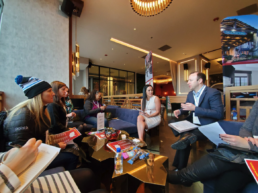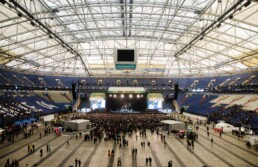From an Attendee: How a Chicago Planner Event Mastered the Roundtable Discussion
Original article from Corporate Event News
 When I first learned about Chicago Planner Master Class, I was intrigued. Put on by Ateema Media & Marketing, this series of events designed specifically for professional event planners and event marketers isn't a typical talking-head education session or a loose networking opportunity. Instead, events (which take place several times a year) are structured as a brief introduction from a partner sponsor followed by 10 roundtable discussions on topics pre-selected by attendees.
When I first learned about Chicago Planner Master Class, I was intrigued. Put on by Ateema Media & Marketing, this series of events designed specifically for professional event planners and event marketers isn't a typical talking-head education session or a loose networking opportunity. Instead, events (which take place several times a year) are structured as a brief introduction from a partner sponsor followed by 10 roundtable discussions on topics pre-selected by attendees.
I attended my first one this week and not only did I learn a lot, I was also impressed with the layout and flow of the event. Here are a few tips for planning your own event roundtables, based on Ateema's success with this series.
Choose the right venue
The Master Class I attended took place at SX Sky Bar, in the recently overhauled Hotel Essex in Chicago's South Loop. With a wide range of oversized, colorful furniture and unique nooks throughout the space, this new venue - also filled with natural light and overlooking Grant Park - lends itself perfectly to intimate group discussions. It was fun to flow through the space and pick a new perch, from a cozy booth to an Alice in Wonderland-esque high-backed chair to a low stool. In a typical ballroom setting with standard round tables, the structure of this event would not have been nearly as engaging.
Carefully explain the format to attendees ahead of time ? several times
Ateema did a great job sending out informative email communications several days in advance of the event. This pre-event information, combined with an agenda handed out on-site (see below), ensured all participants knew exactly how the event would flow.
Pick relevant discussion topics
The discussion topics at the event were preselected in advance based on feedback from attendees, which was an excellent way to encourage participation and build interest. It's important to pick relevant and timely topics that pique attendees' interest (for example, we could have easily added a topic around health at events, based on the current coronavirus outbreak).
Here's what we talked about in the class:
- How to draft a site plan while in a unique venue
- Questions to consider when partnering with a DMC
- Benefits of gamification at your events
- How to find local planner resources
- Digital marketing strategies for your next big event
- Using events as an outlet for CSR
- What to look for when inspecting a potential event site
- Choosing spatial assignments to best fit your event
- How to incorporate new technology into your event design
Make agendas that are easy to follow
Building schedules in advance and assigning each person an order of tables would have been complicated and time-consuming for event staff. Instead, a staffer simply had a stack of schedules and handed them out one by one, in no particular order, during registration. This was an easy way to ensure everyone had a unique schedule and groups would be randomized, so that you'd interact with different groups at each session.
Stick to the scheduled times
While the event intro kicked off about 10 minutes late, the rest of the morning went as planned: From 9AM to 12PM, attendees visited all 10 roundtable discussions, following the format of 1 minute for brief introductions, 3 minutes of sponsor pitch and then 10-12 minutes of group discussion. Event organizers raised the volume of the music when it was time to switch areas, an easy way to signal the transition without being intrusive. We had 2 minutes to migrate to the next table, just like musical chairs. Keeping to schedule meant there was no confusion over what was taking place, when.
Incorporate at least one active station
Two of the 10 stations featured something active. At one roundtable, we talked while making DIY candles from sand wax and fragrance in partnership with Live Art International (a company that sources live entertainment for groups), and another 'roundtable' was a quick tour of Hotel Essex. We walked and talked quickly and got our blood flowing, which stimulated learning and knowledge retention from the morning.
Create sponsorship activations
Having a sponsor for each roundtable discussion was a killer way for event organizers to help cover their costs (or maybe even make a profit). For the most part, each sponsor was experienced with the topic at hand (for example, Luxe Productions led the group on new event technologies) and as such, attendees were keen to ask questions and be involved in the discussion.
Want to check out Chicago Master Planner Class for yourself? The next one is set for March 24 at City Winery; learn more here. Ateema also holds events in San Francisco.
How have you incorporated roundtable discussions into your events? What formats have brought you success, or what challenges have you learned from? Share with us in the comments or email me.
4 Ways to Inspire Exhibitors to Adopt New Technology

The "If it ain't broke" mentality sounds good if we're talking about a bicycle or a toaster. But when we're talking about business tech, people in every industry have a natural reluctance that blinds us to possibility. Yes, it's working fine, but it could be working better. When we introduce new tech, we usually get a big surge up front from the early adopters, and then it tapers right off. So how do you hook those people in the middle and keep the bell curve going? Here are the markings of successful tech adoption at events:
1. The Tech Serves The Attendees
You know your market, you know what your attendees are all about. Technology that helps them meet their goals will be welcome, while tech that does not will be regarded as mere clutter. Tech geeks love new tech for new tech's sake, but most business professionals will allot their time and attention only to that which has a clear, practical purpose for them in their work. If you want your attendees to use the technology, consider these questions: What problem does this solve? What task does it make easier? You'll need to consider these questions beforehand, because these are the questions that attendees are going to want answered.
2. The Event Is Structured To Encourage Engagement
You can't just drop new tech onto a crowded event floor and expect people to be excited. The event has to be orchestrated so as to encourage engagement with the new technology. Integrating the new tech directly into the event will help attendees to understand precisely what makes it useful. Distributing an app for the event instead of brochures and physical maps, for instance, will go a long way towards pushing engagement. Wherever you can incorporate the tech, incorporate the tech.
3. You Can Count On The Wi-Fi
No matter how good the tech rollout is on every other front, if people have trouble accessing wi-fi on the event floor, it will all be for naught. This can be the number one barrier to engagement. You may have a tech-savvy crowd eager to engage, tech that's intuitive and easy to pick up, but if people simply can't connect then what good is any of that?
4. Attendees Have Been Primed
Getting people excited for the new tech that's going to be coming to the event through an email campaign can be very helpful. Even better: You can get people acquainted with the tech before they see it firsthand. This way you can save time on in-person tutorials, since many of your attendees will already have grasped the basics from the email campaign. This can drive enthusiasm for the tech and make it seem less alien on first encounter.
Even in tech-heavy fields, there's always going to be a reluctance to embrace something totally new. This can be a problem at events, where you need everyone to get up to speed quick. But by following these guidelines, you should be able to maintain a higher rate of success in adoption to the new apps and gadgets.
Original post on Expo Pass.
How to Keep Attendees Engaged Before Your Event
Creative Ways to Communicate and Interact - Before Kickoff

As an event planner you've no doubt learned a few tricks when it comes to interacting with the public to promote your event. Sure, your marketing team likely has a hard-hitting strategy in place, but take a moment to ask yourself, "What really will make pique interest?" Chances are, what worked five - or even two - years ago isn't quite catching the eye of your audience, so your attendee engagement today has to be just as amazing as your event agenda and catering menu to get people excited and in the seats.
When it comes to the event planning industry, we've seen it all - the blanket email blasts, the social media shout-outs - but in a world that revolves around an inbox of promotional emails and social media posts, is your current communication strategy the most efficient for keeping you top of mind to your audience? Understanding best practices for maintaining streamlined and consistent engagement strategies and how they help to keep interest levels high is a priority in the event planning space.
Read on for some creative ways to make sure your message doesn't get lost in the shuffle:
Ask For Feedback And Ask It Often
Who doesn't like feeling included in the planning of something great? Engaging with attendees through surveys, polls, and even quizzes not only offers and interactive means to gather audience data and new ideas, it allows your audience to feel like they have a stake in the outcome of the event - meaning a more engaged audience on site!
Set up short polls on Facebook and Twitter, create an online quiz, and send surveys via email in the months leading up to your event. You'll be surprised at the amount of valuable feedback you'd be missing out on by not asking!
Content is King
While much of your database may consist of previous event attendees and engaged email subscribers, how are you promoting your upcoming event to brand new eyes? Creating engaging, organic content through a series of blog posts, LinkedIn articles, and guest posts on sponsor websites is an effective way to boost engagement with potential attendees who are searching for specific industry-related content. Respond to comments and lead impromptu discussions with your audience to keep them interested.
People trust industry experts, so positioning yourself as a thought leader on your event topic makes you and your event even more reputable than you already are - and who doesn't want that!
Give Registrants a Means to Interact Before the Event
Promoting an event doesn't stop at a catchy event hashtag. We live in an age where we can communicate with whomever we want anytime we want - so give your attendees a way to network with one another before they sit down to listen to the Keynote speaker! Consider using a LinkedIn group, a slack thread, or even better use an online event management system. Give your attendees access to event FAQs, networking with fellow industry professionals and solution providers, and a place where they themselves can post questions to their counterparts. Creating this buzz ahead of your event is a creative way to add an air of excitement for what's to come on site.
Say Hello - Face To Face!
Give attendees a sneak peek into the content of your event by hosting a webinar! Ask one of your speakers to host it and focus on a topic or two to discuss with your audience, complete with Q&A and a chat panel. Your webinar attendees will appreciate getting an inside look into their investment and you'll be able to use that data to tailor future marketing messages to them leading up to your event. A small taste of what's to come can be enough to keep your attendees talking not only to you, but to their colleagues and cohorts too. And who doesn't love a few extra registrations?
______
Getting creative and having fun with your audience sets the precedent that your event is one of a kind, while opening the lines of communication with you and their fellow attendees ahead of event kickoff. The work you put forth engaging your attendees ahead of your event will help facilitate livelier discussions and more interaction once they're on site - and that's an event planners dream!
Original post featured on Expo Pass.




